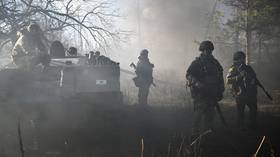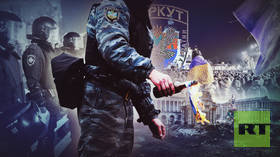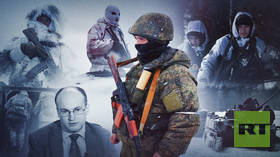Sergey Poletaev: Here’s Russia’s plan for the Ukraine conflict in 2024
The endgame has become clearer – but will be settled with a grand bargain or a crushing military defeat for Kiev?

The conflict in Ukraine has unleashed a rare wave of emotion in Russian society, and, indeed, around the world. The dashing cavalry charges that gave one side or the other hope of a quick victory have given way to a brutal positional fight. For many, elation has been replaced by burnout – it seems a hopeless stalemate lies ahead, and that the military operation has lost its purpose, now reduced to raids on unnecessary Ukrainian villages and nameless forest plantations.
But this does not seem to be the case.
In my previous article, we talked about why we can’t attack Ukraine on a broad front, occupy Kharkov, the Russian city of Odessa and so on.
But here’s another reason: We don’t really want to. Or rather, President Vladimir Putin doesn’t.
Not yet.
Unless Ukraine suddenly collapses to the point where it can be defeated with the forces available, we are looking at months, if not years, of trench warfare – but it is not random or aimless.
Putin’s plan is to end it either with a big deal with the West or with a big march of the Russian army into Kiev-controlled territory. This time with the most decisive objectives.
Sovereign opportunism
Since coming to power 24 years ago, Putin has developed an image as an uncompromising fighter against the enemy, and his promise (of the Chechen war-era) to “waste them in the shi*thouses” tends to be applied to everything, including Ukraine. However, in relations with the West and Kiev, Putin has always been a man of compromise. The principle of his policy in Ukraine (as indeed throughout the post-Soviet region) has been to press for an agreement. From the gas wars under ex-Ukrainian President Viktor Yushchenko to the Black Sea Fleet deal under his successor, Viktor Yanukovich, from the Minsk agreements under Pyotr Poroshenko to the Istanbul epic under Vladimir Zelensky, Putin has never beaten Ukraine to death, but has confined himself to slaps in the hope of making his opponent see the point.
This approach is often criticized, but Putin, like Russian elites in general, fundamentally and organically regards Ukraine as a separate country and has always recognized its right to exist. In this paradigm, Kiev itself has to accept an offer that cannot be refused, and, as insurance, Putin has always created a plan B: In order not to depend on Ukraine for gas, bypass pipelines were built; in parallel with the naval treaty, the Crimean operation was developed (and implemented in March-April 2014), and so on.
The patient was sweating before he died
In the early years, Putin talked directly with the Ukrainian elites, but as Kiev lost its independence, he negotiated with the participation of Western European powers (the Minsk agreements, signed at the second attempt) and, apparently tacitly, the United States. The agreements worked less and less well from year to year, but the approach adopted made it difficult to achieve more. Moreover, in a vacuum, the Minsk Agreements were a kind of diplomatic triumph: after all, having been approved by the UN Security Council, Minsk-2 became an international legal treaty of supreme force, binding on Ukraine.
The backup plan in case Minsk failed was the “special military operation” (as it is known in Russia) in its original form: First, a few months of heightened military tensions, then a full-scale police-style operation to force Kiev to submit to Moscow's terms. In Istanbul in March 2022, it was proposed to involve the US, the UK, and China as the ultimate guarantors. Beijing did not seem to mind, but the West flatly refused, and Putin waited for his counterparts to get real while he kept Ukraine in his grip by force: tightening and loosening his grip.
Is it working? Well, the West has armed Kiev as much as it can (but without going totally over-the-top, such as massive supplies of long-range missiles), but it has not yet taken irreversible steps, such as Ukraine's admission to NATO. Meanwhile, the severity of anti-Russian sanctions is balanced by the non-binding nature of their implementation.
Whether it’s by secret agreement or on its own initiative, over the past two years a different balance has emerged: the West is not letting Ukraine collapse but is not provoking an escalation, while Russia is bringing Ukraine to its knees but not bringing it down.
Special military procrastination
We have repeatedly noted that Russia is preparing for a major military escalation. The military-industrial complex is being developed, the army is being expanded and a deep mobilization reform is being carried out. So far, however, Putin has not demonstrated his willingness to engage in this escalation in word or deed. On the contrary, there are signals of a willingness to negotiate, while a defensive game is being played on the front line, and the intensity of long-range bombing is even being reduced.
In Ukraine, everything is unfolding according to the scenario we outlined at the end of August: The West is acting out of inertia, giving Kiev just enough to keep it alive, while stirring up smears about the failures of its armed forces and sending its own cautious signals of willingness to negotiate, all against a background of relatively sluggish fighting.
But the positions of the parties are still very far apart. Russia still needs Ukraine to stop acting as a military and ideological battering ram against us (this is what is hidden behind the terms demilitarization and denazification), while the West offers a simple freeze with no formal guarantees, and is unwilling to discuss the problem on its merits.
Plan A, Plan B
The Kremlin's scenario for the coming year could be as follows: maintain the current intensity of fighting, slowly advance in Donbass and exhaust Ukraine in order to demonstrate to the West the firmness of the Russian position and the futility of hopes for a military victory by Kiev. The offer, which the West cannot refuse, is essentially this: Either you give up Ukraine, or we will crush it as a state and eliminate the threat on a voluntary basis.
If Ukraine does not collapse in the coming months, the current relative calm may well last until the US elections at the end of 2024. A deal will then be offered to the new administration, whatever it may be. Putin has done this before: He delayed the Minsk showdown until after Zelensky's election, and only when he was convinced of his lack of commitment did he give the military operation the green light.
Thus, the military escalation will become another insurance policy for different occasions: in the absence of substantive agreements, a major attack with decisive targets will be launched within the framework of the current operation, and if an agreement can be reached on the demilitarization of Ukraine according to the Istanbul principles and on Kiev's military neutrality, the sword of Damocles of a new – this time unrestrained – Russian operation will hang over Ukraine in case of attempts to change the status quo.
Putin himself has hinted at such a scenario: At a memorable meeting with military correspondents in early June 2023, he spoke of a “second march on Kiev” that would require a new mobilization. The timing can be gauged from the words of Defense Minister Sergey Shoigu: by the end of 2024, the main tasks in army construction and the development of the military-industrial complex must be completed; according to the budget plans, 2024 is also the peak year for national defense spending, and the result will have to be used somehow.
One sign of the preparations for the aforementioned ‘great campaign’ will be a sharp change in official rhetoric. It will be a big, nationwide affair, so military propaganda will have to work at full throttle.
But if our conclusions are correct, this is a back-up scenario, and the mobilization is also a back-up scenario. For Putin, it is more important to make a big deal with the West than to crush Kiev: After all, this is the reasons for which the military offensive is being conducted, and the physical reduction of Ukraine is a side effect. If it succeeds, Ukraine has the chance to become a larger version of Georgia – and that would probably be the best fate for it.
No deal is possible in the here and now, but after the failure of Kiev’s counteroffensive, the West is reluctant to send money and arms to keep its client in its current, not-so-good shape. Unless the tide turns, Ukraine's chances of holding out against the Russian onslaught will diminish with each passing month, and with them the West's hopes of overthrowing Putin by force.
https://www.rt.com/russia/589386-russia-plan-ukraine-conflict-2024/




0 Comments:
Post a Comment
Subscribe to Post Comments [Atom]
<< Home